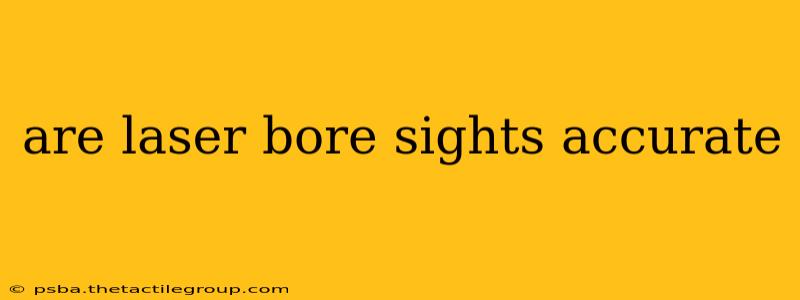Laser bore sighting tools have become increasingly popular among firearms enthusiasts and professionals alike, promising a quick and easy way to zero in rifles and other firearms. But how accurate are they, really? This in-depth analysis will explore the precision of laser bore sights, examining their advantages, limitations, and ultimately, whether they're the right tool for your needs.
Understanding Laser Bore Sight Technology
Laser bore sights are devices that use a small laser to project a beam through the barrel of a firearm. This laser simulates the trajectory of a bullet, allowing the shooter to align the sights or scope with the bore axis without expending ammunition. The process involves inserting the laser bore sight into the barrel's chamber, activating the laser, and adjusting the sights until the laser dot aligns with the target. Sounds simple, right? The accuracy, however, depends on several factors.
Advantages of Using Laser Bore Sights
- Speed and Efficiency: Laser bore sighting is significantly faster than traditional methods, saving time and ammunition. This is especially advantageous for initial sight-in or when working with multiple firearms.
- Safety: The absence of live ammunition makes the process safer, minimizing the risk of accidental discharge.
- Convenience: Laser bore sights are portable and relatively inexpensive, making them a convenient option for both home use and on-the-go adjustments.
Factors Affecting Accuracy of Laser Bore Sights
While laser bore sights offer many benefits, their accuracy can be impacted by several factors:
1. Bore Alignment and Laser Placement:
The laser must be perfectly centered within the bore to provide an accurate representation of the bullet's trajectory. Any misalignment, even slight, will introduce error. High-quality laser bore sights are designed to minimize this error, but it remains a crucial consideration. Improper insertion or a poorly-designed bore sight can significantly affect accuracy.
2. Laser Beam Divergence:
Laser beams aren't perfectly collimated; they diverge slightly over distance. This divergence becomes more pronounced at longer ranges, leading to reduced accuracy at extended distances. High-quality laser bore sights use lasers with minimal divergence to mitigate this effect.
3. Barrel Condition:
A damaged or worn barrel can distort the laser beam, compromising accuracy. Significant pitting, erosion, or deformation will affect the precision of the bore sighting.
4. Environmental Factors:
External conditions like temperature and humidity can slightly influence the laser's path, though this is typically a minor factor.
Accuracy in Practice: Realistic Expectations
While laser bore sights offer a quick first approximation, it's crucial to understand that they don't guarantee perfect accuracy. They are best considered a tool for initial boresighting or for minor adjustments. Always follow up with live fire zeroing at the range to confirm and fine-tune your sight adjustments. Relying solely on laser bore sighting for precise long-range accuracy is not recommended.
Conclusion: Laser Bore Sights – A Valuable Tool, Not a Perfect Solution
Laser bore sights are a valuable addition to any firearms owner's toolkit, particularly for their speed and safety. However, it's essential to manage expectations regarding accuracy. They are excellent for initial sight-in or quick adjustments, but always verify and refine your zeroing with live fire at the range. Treat them as a starting point, not an absolute measure of accuracy. Consider the quality of the bore sight and the condition of your firearm when interpreting the results. Using a laser bore sight responsibly will enhance your shooting experience, but remember that it's part of a larger process towards achieving accuracy.

